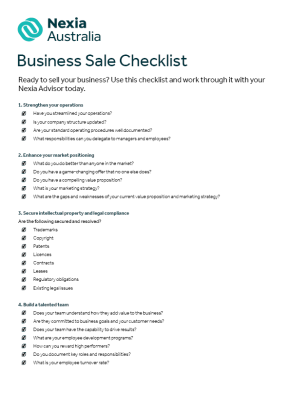Whether you're retiring, pursuing new ventures, or looking to cash in on your hard work - selling a business is a significant milestone. One that needs careful planning and preparation.
Here are 8 key steps to prepare your business and maximise its value:
1. Strengthen your operations
Before you make that listing, have you streamline your operations? Are your standard operating procedures (SOPs) well documented?
By strengthening your operations, you enhance the perceived value of your business. It's important that you delegate responsibilities to capable managers or employees early on.
This tells prospective buyers that the business can run without your direct involvement. Even buyers unfamiliar with the industry tend to buy businesses for higher prices if it means a smooth transition of ownership.
After all, why settle for a limited setup when you can enjoy the benefits of a well-structured business?
2. Enhance your market positioning
What do you do better than anyone in the market? Do you have a game-changing offer that no one else does?
You want to articulate that with a compelling value proposition and marketing strategy. It's the perfect opportunity to showcase your unique selling points. This also tells buyers that you understand what they value and share the same views.
In the process, gather trusted external advisors to give you objective, unbiased feedback. This identifies gaps that may deter buyers and helps you unlock opportunities.
Buyers seek businesses with a strong market position and growth potential. With a clear value proposition and a solid marketing strategy, you set yourself up for increased inquiries and faster sales.
3. Secure intellectual property and legal compliance
Before you hand over ownership, are your trademarks and copyright updated? Are your patents and licences secured and transferrable?
You want to make things as easy for potential buyers as possible. This starts with an audit of your intellectual property and legal obligations.
Make sure to review existing contracts, leases, and regulatory obligations in the process. The last thing you want is to hand over issues with your business, so make sure nothing falls through the cracks.
By securing your intellectual property and legal compliance, you reduce risks for potential buyers and speed up the sale.
4. Build a talented team
Does your team understand how they add value to the business? Are they committed to business goals and your customer needs?
A skilled and motivated workforce adds tremendous value to your business. This tells buyers that your team has the capability and commitment to drive results.
This starts by investing in employee development and rewarding high performers. Be sure to document key roles and responsibilities in the process. Don't forget to review employee contracts and non-disclosure agreements as well.
Buyers look for companies with low turnover rates. You show your business's sustainability and growth potential by fostering a positive workforce.
5. Clean up your physical and digital assets
Are your facilities safe? Is equipment in good condition, and are you on top of inventory?
When turning over a business, you want to ensure all physical and digital assets are in good condition. Take the time to clean up the space and organise files and equipment. Don't forget to secure sensitive data and update software licences as well.
Buyers don't want to waste any time troubleshooting your inventory and tech stack. So, be sure to take that burden away from them from the get-go.
Remember, a well-kept and efficient work environment tells buyers they're acquiring a well-managed and valuable business.
6. Conduct regular financial reviews
What's the status of your financial records? Are financial statements and relevant documents accounted for?
Before listing your business for sale, conduct a thorough financial review. Consulting with your accountant ensures accuracy and addresses any red flags.
Don't underestimate your buyers' ability to scrutinise these records. You can bet they will evaluate your business' profitability and potential for growth.
Staying on top of your financial reviews sets your business up for higher valuations and faster sales.
7. Check in on yourself
Are you ready to step back from your role in the business? What's the plan after this milestone?
Envision your post-business lifestyle and consider. Give your team more agency to run the business without you as well. This will make the transition much easier.
Selling a business can bring a mix of emotions, including a sense of loss, purpose, or identity. It's important to have a plan in place after the sale.
By knowing when to draw the line, you widen your horizons. At the same time, you give buyers room to settle into the business and truly make it their own.
8. And finally - give it time
What else can you optimise within your business? How can you make the most of the time between now and the sale?
Selling a business takes 6 to 12 months (or even longer). It's a multifaceted endeavour that needs careful attention across all areas of business. Be sure to invest your efforts into thorough planning.
Connect with advisors and accountants. Don't forget to organise all assets and address any issues to ensure everything is in place. This gives you enough time to prepare your business and improve your processes.
By the time you have a prospective buyer, your business will be in top shape for the transition.
What’s next?
Remember, each business is unique. It's essential to tailor your business sale preparations to your specific situation.
Investing effort into thorough planning and allowing ample time increases the likelihood of achieving a successful and rewarding sale outcome. So, take the necessary steps, rely on real data and sources, and position your business for a successful sale that rewards your hard work and sets you up for the next chapter of your journey.
Contact your Nexia Business Advisor today to get started.


